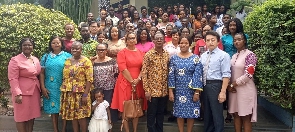 Delegates who were present at the inauguration of the school launch intervention policy
Delegates who were present at the inauguration of the school launch intervention policy
Ghana’s school feeding programme is set to receive a major boost in the coming years, thanks to a multi-sectoral intervention policy currently under consideration formulated towards protecting vulnerable school children across the country from the programme’s worsening food insecurity crisis.
The Noguchi Memorial Institute for Medical Research (NMIMR) and the International Food Policy Research Institute (IFPRI) in collaboration with other major stakeholders on Tuesday introduced the school launch intervention policy in Accra.
The project is designed to play an important role in long-term human capital formation by improving young children’s nutrition conditions and learning performances.
NMIMR and IFPRP stressed that the project will leverage on Japan’s expertise in school lunches to ensure the food security of vulnerable school children against the worsening food insecurity crises by redesigning menus and strengthening linkages to local agriculture based on Japan’s experience in the school lunch program.
The two entities during an inception meeting dubbed: 'protecting vulnerable children from exacerbated food insecurity crisis through Japan’s expertise on school launch: intervention in Ghana' outlined three areas of interventions including governance/finance, nutrition and behavioral change to be implemented on a pilot basis in 40 selected basic schools across the country over one academic year.
Out of this, twenty will be selected to receive financial intervention for nutrition.
The ultimate aim, based on a successful output is to expand the project to schools throughout the country.
The inception meeting offered the NMIMR and the IFPRI the platform to involve relevant stakeholders in their implementation of the school feeding intervention while calling for their assistance and involvement.
The project to be ran alongside Japanese school lunch experts from the University of Niigata Prefecture and the Japan Society of Nutrition and Dietetics in collaboration with the Ghana School Feeding Program together with other key stakeholders aims at introducing a viable school meals intervention aimed at adding value to the Ghana School Feeding Program.
Deputy minister of Gender, Children and Social Protection, Francisca Oteng Mensah speaking on behalf of the sector minister, Hajia Lariba Abudu noted that the Home Grown Ghana School Feeding Programme (HGSFP) was initiated as a Social Protection Intervention within the context of the Comprehensive African Agricultural Development Programme (CAADP) Pillar III.
Reiterating the vision of the GSFP, she said the programme like other National Social Protection Interventions, provides an opportunity to pursue Ghana’s commitment to Sustainable Development Goals with particular emphasis on Goal 1 and 2 which seek to end poverty in all its forms everywhere and ending hunger, and achieving food security and improved nutrition respectively.
To equip caterers to cook nutritious meals for the children, Oteng Mensah noted that its flagship 'innovative practical nutrition' training offers a hands-on practical training to its caterers with over 15,000 caterers and cooks trained so far.
To further improve the nutrition, training and menu designs of the GSFP, the deputy minister said the Gender Ministry welcomes interventions lessons learnt from the Japanese government, experts from the University of Niigata Prefecture and the Japan Society of Nutrition and Dietetics to assist local Ghanaian experts and the GSFP to improve school menus as well as strengthen linkages to local agriculture.
Dr Futoshi Yamauchi, Senior Research Fellow, Markets, Trades and Institutions at the International Food Policy Research Institute presented a comprehensive outline of the project.
He later explained in an interview that a thorough assessment of the project would be conducted after its year-long pilot to determine its next phase.
He however expressed confidence in the successful implementation of the project to benefit the Ghanaian child.
Director of the Noguchi Memorial Institute for Medical Research at the University of Ghana Legon, Prof. Dorothy Yeboah-Manuhe noted that the Noguchi Memorial Institute for Medical Research has collaborated with various Japanese institutions since its establishment 43 years ago and the International Food Policy Research Institute (IFPRI) for over a decade now to improve various aspects of the Ghana School Feeding Program.
Ghana’s school feeding programme which began with an initial pupil enrolment of 64,000 at the end of the 2005/2006 academic year has steadily risen to 3.8 million in 2023.
The programme has however suffered implementation challenges over the years where supply of regular meals has been difficult to sustain as well as the lack of suitable school facilities, quality food, and certified dieticians which continue to remain a challenge.